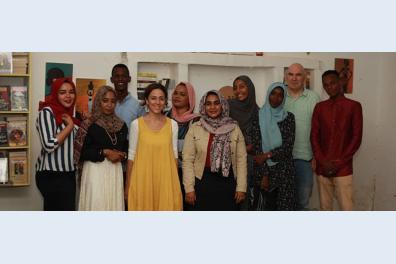Marcella Rubino's field mission: A survey of literary spaces in Khartoum (October 1 to 11, 2022)

The mission's objective was not only achieved, but thanks to the unfailing collaboration of the Sudanese interlocutors, Marcella Rubino was able not only to realize her initial intentions, but to exceed them by herself becoming a player in these cultural activities through literary encounters that she was invited to host, either alone or with her Belgian colleague Xavier Luffin.
She was thus able to visit and photograph the following venues, and speak at length with their managers:
- The Abd el-Karim Mirghani Center (named after an eminent Sudanese scholar and notable) in Omdurman, one of the capital's oldest cultural centers and organizer of the Tayyeb Salih Prize for the Sudanese Novel;
- The Abd Allah al-Tayyeb Center (named after an eminent Sudanese scholar), part of Khartoum University, which has organized several symposia and study days on Sudanese, African and Arabic literature;
- The House of Poetry, also dependent on the University of Khartoum;
- The al-Khatim Adlan center (named after a Sudanese communist activist), with a communist orientation, very active in youth training, music, visual arts and literature. Since the 2018 revolution, this center near the University district has been devoted mainly to political debates and social activities;
- The Nirvana center, of more recent formation, directed by the young and dynamic Muhannad Rajab, himself a novelist. Its activities range from film screenings and debates to concerts and literary debates. It is located in the affluent Riyadh district.
- The Nartaqi ("to rise") center, run by the young writer Isra al-Rayyes, in the residential al-Manshiya district. The center, popular with young people, has an extensive library, a bookshop and is also a publishing house. It offers literary writing workshops, literary meetings and societal debates, training in several fields;
- The al-Fa'l ("optimism") center, in the Amarat residential neighborhood, run by novelist and short-story writer Sarah al-Jak, dedicated to literary training especially for young women (but also young men) through writing workshops and literary meetings and debates.
- The Rateena cultural café, in Buri, run by young entrepreneur Omar Ashari, a member of the large Sudanese company Dal. Rateena is his personal project and offers mainly concerts at present, but intends to put literary encounters back on its 2023 agenda. This café is the only such profit-making venue we visited.
To all these meetings must be added an interview with the Minister of Culture Abd el-Qader Jaraham, whom she was able to question about the current government's cultural policy and possible collaboration with these various venues for literary activity, as well as with publishers and the Sudanese Writers' Union.
Foreign cultural centers (French, English, German and Turkish in particular) also participate in this literary and cultural life more generally. Apart from the French cultural center, where she held a conference on the translation of Sudanese literature, it was not possible to visit the others due to the limited duration of the field trip.
This overview revealed several things: a very dynamic society, even in these difficult times under a regime that emerged from a coup d'état; a profusion of cultural centers, ranging from the oldest and most traditional to the youngest, both knowing each other and willingly working together; a relative decrease in literary activities since the 2018 revolution, to the advantage of political meetings and debates; a great faith in literature and a great respect among the younger generations for writers and their works, a desire to read world literature and to train in writing and translation.
This field trip was made possible thanks to the support of CEDEJ Khartoum and will be the subject of an elaborate report to be published. In addition, meetings with the heads of the language departments of 4 Khartoum universities (University of Khartoum, Ahliya, Nilein and University of Sudan) during the same stay paved the way for future collaborations, which will form the basis of the JCJC project she is presenting to the ANR evaluation committee this year.
The JCJC project will be presented to the ANR evaluation committee this year.